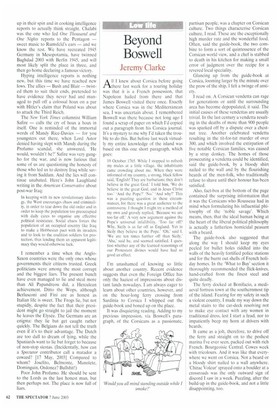Beyond Boswell
Jeremy Clarke
Ai] I knew about Corsica before going there last week for a touring holiday was that it is a French possession, that Napoleon hailed from there and that James Boswell visited there once. Exactly where Corsica was in the Mediterranean sea, I was uncertain about. I remembered Boswell was there because not long ago I found a scrap of paper on which I'd copied out a paragraph from his Corsica journal. It's a mystery to me why I'd taken the trouble to do this. But before last week virtually my entire knowledge of the island was based on this one short paragraph, which goes: 19 October 1765, While I stopped to refresh my mules at a little village, the inhabitants came crowding about me. When they were informed of my country, a strong, black fellow said, 'English! They are barbarians; they don't believe in the great God.' I told him, 'We do believe in the great God, and in Jesus Christ too.' And the Pope?' No."And why?' This was a puzzling question in these circumstances, for there was a great audience to the controversy. I thought I might try a method of my own and gravely replied, 'Because we are too far off.' A very new argument against the Pope's universal infallibility. 'Too far off? Why, Sicily is as far off as England. Yet in Sicily they believe in the Pope.' 'Oh,' said I. 'We are ten times further off than Sicily.' `Aha,' said he, and seemed satisfied. I question whether any of the learned reasonings of our Protestant divines would have had so good an effect.
I'm unashamed of knowing so little about another country. Recent evidence suggests that even the Foreign Office has only the haziest of impressions about distant lands nowadays. I am always eager to learn about other countries, however, and on the hour-long ferry crossing from Sardinia to Corsica I whipped out the guide-book and boned up on the place.
It was disquieting reading. Adding to my previous impression, via Boswell's paragraph, of the Corsicans as a passionate, partisan people, was a chapter on Corsican culture. Two things characterise Corsican culture, I read. These are the exceptionally high murder rate and the wonderful food. Often, said the guide-book, the two combine to form a sort of quintessence of the Corsican world view, and a chef is stabbed to death in his kitchen for making a small error of judgment over the recipe for a revered local speciality.
Glancing up from the guide-book at Corsica, looming larger by the minute over the prow of the ship, I felt a twinge of anxiety.
1 read on. A Corsican vendetta can rage for generations or until the surrounding area has become depopulated, it said. The initial causes of these vendettas are usually trivial. In the last century a vendetta resulting in the deaths of more than 900 people was sparked off by a dispute over a chestnut tree. Another celebrated vendetta resulting in the tit-for-tat murder of over 300, and which involved the extirpation of five notable Corsican families, was caused by a stray donkey. The homes of those prosecuting a vendetta could be identified, said the guide-book, by a bloody shirt nailed to the wall and by the flourishing beards of the men-folk, who traditionally refuse to shave until their honour has been satisfied.
Also, fact-box at the bottom of the page contained the surprising information that it was the Corsicans who Rousseau had in mind when formulating his influential philosophy of the 'noble savage'. Which means, then, that the ideal human being at the heart of the liberal political philosophy is actually a fatherless homicidal peasant with a beard.
The guide-book also suggested that along the way I should keep my eyes peeled for bullet holes riddled into the walls of the heavily fortified police stations and for the burnt out shells of French holiday homes. In the 'What to Buy' section it thoroughly recommended the flick-knives, hand-crafted from the finest steel and quite deadly.
The ferry docked at Bonifacio, a mediaeval fortress town at the southernmost tip of the island. Fearing for my safety in such a violent country, I made my way down the metal stairs to the car-deck resolving not to make eye contact with any women in traditional dress. lest I start a feud, nor to impatiently beep my horn at drivers with beards.
It came as a jolt, therefore, to drive off the ferry and straight on to the poshest marina I've ever seen, packed out with rich French. Bourgeoisie Central. Cowes week with tricolours. And it was like that everywhere we went on Corsica. Not a beard or a bloody shirt nailed to a wall anywhere. 'Chirac Voleur' sprayed onto a boulder at a crossroads was the only outward sign of discord I saw in a week. Puzzling, after the build-up in the guide-book, and not a little disappointing, too.










































































 Previous page
Previous page